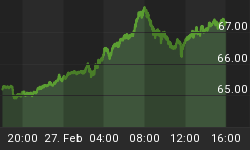A translator asked: "In your book, 'open-mouth policy' occurs many times. Would you please elaborate on this term?"
On the same day, February 11, 2013, Akira Amrai, Japan's economic minister, announced: "It will be important to show our mettle and see the Nikkei reach the 13,000 mark by the end of the fiscal year (March 31)... We want to continue taking (new) steps to help stock prices rise." The Nikkei must hop 17% in less than seven weeks to meet the government's injunction.
Comparing and contrasting the Greenspan-Amrai eras is an illustration of institutional collapse.
Federal Reserve Chairman Alan Greenspan was blamed for operating an "open-mouth policy" as the stock market rose. He did not, however, speak often about the stock market, having shut his mouth on that topic in February 1997.
Greenspan had given his "Irrational Exuberance" speech in December 1996. This alluded to the possibility that asset prices might be too high. He was still concerned about asset prices when he testified before the Senate in February 1997. Senator Phil Gramm from Texas disagreed with the chairman: "I think people hear what you are saying and conclude that you believe equities are overvalued. I would guess that equity values are not only not overvalued but may still be undervalued." Greenspan never again discussed bubbles, either in public or, in private (at FOMC meetings) except to deny the Federal Reserve could either identify or pop one. Speculation swept the country. In July of 2001, Gramm put it to the chairman: "If this is the bust, the boom was sure as hell worth it. You agree with that, right?" The craven poltroon's response: "Certainly." Gramm joined UBS as vice chairman when he retired from the Senate.
Greenspan's references to the stock market after February 2007 were generally oblique testimonials, calling upon rising productivity or Wall Street analyst views. His top priority was to assure the carry-trade that risk was on. Yet, he was discreet. He did not say, directly, the Fed's policy was to boost the stock market. That would have been a step beyond - many, many steps beyond - the protocols of central banking. Even though Greenspan was careful, the chairman's critics voiced strong opposition to his "open-mouth policy." There was no mistake he was rooting for stocks. (In his Credit Bubble Bulletin of September 26, 2003, Prudent Bear fund manager Doug Noland wrote: A few weeks ago hedge fund manager extraordinaire Leon Cooperman was on [TV]. His fund is up big this year, and Mr. Cooperman was pleased to explain his very successful bet on the junk bond market. 'The government wanted us to own them,' if I recall his comment accurately.... Our policymakers have made it perfectly clear - to the home owner, to the stock jockey, to the global bond players, to the derivatives trader - that leverage is the way to easy profits. And everyone has been rushing full-throttle to play inflating asset markets...")
A decade or so later, central banks are desperately attempting to prevent an asset crash. Maybe an economic crash too, if they give any thought to such distractions. In 1999, then-Fed chairman Alan Greenspan triggered a final stock-market fling when his Y2K crash-prevention strategy consisted of issuing $50 billion into the banking system. From that point, the Nasdaq more than doubled, then peaked, then crashed.
In 2013, Fed Chairman Ben Bernanke is buying over $100 billion of securities each month (with newly created dollars tapped off a keypad). At a rate of over $1 trillion a year, quite a hike from Greenspan's $50 billion in 1999, he is getting very little for it. Maybe $10 trillion would spur a Nasdaq-like lift, but he is only inflating the world's prices now. Apparently not oblivious to a lack of oomph in his thesis, Simple Ben has added "communications" as a Federal Reserve tool to fulfill its missions. (The Fed has announced 30 or so missions, policies, and deceptions.)
An example of the Fed's explicit communications strategy was offered by William C. Dudley, Federal Reserve President of New York, speaking at City University of New York, on October 1, 2010: "We have tools that can provide additional stimulus at costs that do not appear to be prohibitive.... [P]urchases of long-duration assets [by the New York Fed will] pull down the level of long-term interest rates.... [L]ower long-term rates would support the value of assets, including houses and equities and household net worth."
On January 13, 2011, Chairman Bernanke was interviewed by CNN. A capsule: "He pointed out that since he signaled the Fed would likely unveil QE2 during a speech in Jackson Hole, Wyoming [August 27, 2010 - FJS], that the Russell 2000 of small cap stocks is up 30%, even more than the 15% to 20% rise in blue chip indexes." The Japanese government's price target is simply the next step. Eliot Spitzer hounded Henry Blodgett for such indiscretions less than a decade ago.
The academics who run central banking today probably think Russell 2000 is a classroom in the chemistry department.
So what is an investor to do? Trying to divine whether this is a "risk on" or "risk off" day can be a challenge. One hedge-fund manager sent along his risk-on, risk-off (RORO) approach: "In the spirit of RORO, I simply tell my investors whether I'm risk on or risk off, using the initials to stand in for the words themselves. So it's either RO, or RO. My new communications transparency, learned by studying the Fed, has worked wonders with my investor relations."
Bernanke and his fellow fruitcakes have made owning paper assets a worse gamble than Vegas.
Frederick Sheehan writes a blog at www.aucontrarian.com
















